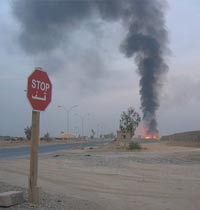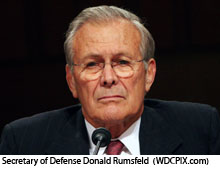The New York Times and Pro Publica got an advanced look at a report on the American reconstruction of Iraq -- and it's not pretty.
The report concludes, in the words of the Times and Pro Publica, that even now, "the United States government has in place neither the policies and technical capacity nor the organizational structure that would be needed to undertake such a program on anything approaching this scale."
And it quotes Colin Powell saying that, in the months after the invasion, DOD "kept inventing numbers of Iraqi security forces -- the number would jump 20,000 a week! 'We now have 80,000, we now have 100,000, we now have 120,000.'"
But here's our favorite detail:
When the Office of Management and Budget balked at the American occupation authority's abrupt request for about $20 billion in new reconstruction money in August 2003, a veteran Republican lobbyist working for the authority made a bluntly partisan appeal to Joshua B. Bolten, then the O.M.B. director and now the White House chief of staff. "To delay getting our funds would be a political disaster for the President," wrote the lobbyist, Tom C. Korologos. "His election will hang for a large part on show of progress in Iraq and without the funding this year, progress will grind to a halt." With administration backing, Congress allocated the money later that year.
There was no evidence in the story that the Times and Pro Publica had offered Korologos a chance to respond, so TPMmuckraker contacted him. He responded in an email:
They did NOT give me a chance to comment. That all came from a 3 page memo I wrote on strategy for passing that first Iraq supplemental in 2003. Some $60 (b) billion was for the military side and $20 (b) billion was for the civilian side. The next sentence said, "The quicker we succeed at CPA the quicker our 150,000 boys will come marching home again."
That response doesn't do much to change the clear impression created by the IG report that Korologos cited President Bush's need to get reelected as a reason to support spending $20 billion of taxpayer money. And that OMB ultimately went along with the request.
Here are some other eyebrow-raising nuggets from the report:
In an illustration of the hasty and haphazard planning, a civilian official at the United States Agency for International Development was at one point given four hours to determine how many miles of Iraqi roads would need to be reopened and repaired. The official searched through the agency's reference library, and his estimate went directly into a master plan. Whatever the quality of the agency's plan, it eventually began running what amounted to a parallel reconstruction effort in the provinces that had little relation with the rest of the American effort.
And...
Money for many of the local construction projects still under way is divided up by a spoils system controlled by neighborhood politicians and tribal chiefs. "Our district council chairman has become the Tony Soprano of Rasheed, in terms of controlling resources," said an American Embassy official working in a dangerous Baghdad neighborhood. " 'You will use my contractor or the work will not get done.'"
And here's a passage that won't exactly boost Donald Rumsfeld's already rock-bottom reputation for knowing what he was talking about:
On the eve of the invasion, as it began to dawn on a few American officials that the price for rebuilding Iraq would be vastly greater than they had been told, the degree of miscalculation was illustrated in an encounter between Donald H. Rumsfeld, then the defense secretary, and Jay Garner, the retired lieutenant general who had hastily been named the chief of what would be a short-lived civilian authority called the Office of Reconstruction and Humanitarian Assistance.
The history records how Mr. Garner presented Mr. Rumsfeld with several alternative rebuilding plans, including one that would include projects across Iraq.
"What do you think that'll cost?" Mr. Rumsfeld asked of the more expansive plan.
"I think it's going to cost billions of dollars," Mr. Garner said.
"My friend," Mr. Rumsfeld replied, "if you think we're going to spend a billion dollars of our money over there, you are sadly mistaken."
In a way he never anticipated, Mr. Rumsfeld turned out to be correct: before that year was out, the United States had appropriated more than $20 billion for the reconstruction, which would indeed involve projects across the entire country.
The report was compiled by Stuart Bowen, a Republican lawyer who serves as the special inspector general for postwar reconstruction in Iraq. The Times and Pro Publica obtained their copies from people outside Bowen's office. The report will be presented February 2nd at a Congressional hearing.











 RAND Report Comes Down Hard on Franks, DOD, State Dept.
RAND Report Comes Down Hard on Franks, DOD, State Dept. Sen. Wyden: Rumsfeld Should Be Held Accountable
Sen. Wyden: Rumsfeld Should Be Held Accountable Rumsfeld Apologizes (But Not to You)
Rumsfeld Apologizes (But Not to You)


